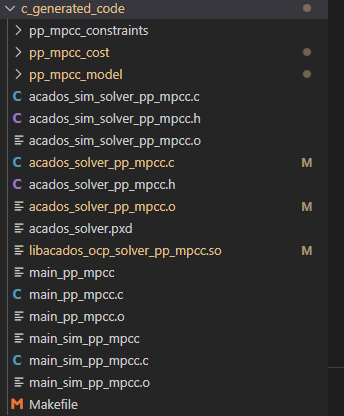Hi Frey.
Thanks for the nice nlp control framework.
I’m trying to use c_generated code generated from the python code.
My ocp name is pp_mpcc so here is the c_generated files.

My goal is to get the same solver output from c code with that of obtained from python code.
Currently I’m using “main_pp_mpcc.c” but, solver returns different solutions compared to the python.
I put the initial value constraints used in Python into lbx0[n] and ubx0[n], and x_init was set as the same values with lbx0 and ubx0. The initial value u0 was 0.
Can you elaborate what i’m miss understanding and suggest what should I do?
Thank you for in advance.
The following is “main_pp_mpcc.c”.
Code
/*
* Copyright 2019 Gianluca Frison, Dimitris Kouzoupis, Robin Verschueren,
* Andrea Zanelli, Niels van Duijkeren, Jonathan Frey, Tommaso Sartor,
* Branimir Novoselnik, Rien Quirynen, Rezart Qelibari, Dang Doan,
* Jonas Koenemann, Yutao Chen, Tobias Schöls, Jonas Schlagenhauf, Moritz Diehl
*
* This file is part of acados.
*
* The 2-Clause BSD License
*
* Redistribution and use in source and binary forms, with or without
* modification, are permitted provided that the following conditions are met:
*
* 1. Redistributions of source code must retain the above copyright notice,
* this list of conditions and the following disclaimer.
*
* 2. Redistributions in binary form must reproduce the above copyright notice,
* this list of conditions and the following disclaimer in the documentation
* and/or other materials provided with the distribution.
*
* THIS SOFTWARE IS PROVIDED BY THE COPYRIGHT HOLDERS AND CONTRIBUTORS "AS IS"
* AND ANY EXPRESS OR IMPLIED WARRANTIES, INCLUDING, BUT NOT LIMITED TO, THE
* IMPLIED WARRANTIES OF MERCHANTABILITY AND FITNESS FOR A PARTICULAR PURPOSE
* ARE DISCLAIMED. IN NO EVENT SHALL THE COPYRIGHT HOLDER OR CONTRIBUTORS BE
* LIABLE FOR ANY DIRECT, INDIRECT, INCIDENTAL, SPECIAL, EXEMPLARY, OR
* CONSEQUENTIAL DAMAGES (INCLUDING, BUT NOT LIMITED TO, PROCUREMENT OF
* SUBSTITUTE GOODS OR SERVICES; LOSS OF USE, DATA, OR PROFITS; OR BUSINESS
* INTERRUPTION) HOWEVER CAUSED AND ON ANY THEORY OF LIABILITY, WHETHER IN
* CONTRACT, STRICT LIABILITY, OR TORT (INCLUDING NEGLIGENCE OR OTHERWISE)
* ARISING IN ANY WAY OUT OF THE USE OF THIS SOFTWARE, EVEN IF ADVISED OF THE
* POSSIBILITY OF SUCH DAMAGE.;
*/
// standard
#include <stdio.h>
#include <stdlib.h>
// acados
#include "acados/utils/print.h"
#include "acados/utils/math.h"
#include "acados_c/ocp_nlp_interface.h"
#include "acados_c/external_function_interface.h"
#include "acados_solver_pp_mpcc.h"
// blasfeo
#include "blasfeo/include/blasfeo_d_aux_ext_dep.h"
#define NX PP_MPCC_NX
#define NZ PP_MPCC_NZ
#define NU PP_MPCC_NU
#define NP PP_MPCC_NP
#define NBX PP_MPCC_NBX
#define NBX0 PP_MPCC_NBX0
#define NBU PP_MPCC_NBU
#define NSBX PP_MPCC_NSBX
#define NSBU PP_MPCC_NSBU
#define NSH PP_MPCC_NSH
#define NSG PP_MPCC_NSG
#define NSPHI PP_MPCC_NSPHI
#define NSHN PP_MPCC_NSHN
#define NSGN PP_MPCC_NSGN
#define NSPHIN PP_MPCC_NSPHIN
#define NSBXN PP_MPCC_NSBXN
#define NS PP_MPCC_NS
#define NSN PP_MPCC_NSN
#define NG PP_MPCC_NG
#define NBXN PP_MPCC_NBXN
#define NGN PP_MPCC_NGN
#define NY0 PP_MPCC_NY0
#define NY PP_MPCC_NY
#define NYN PP_MPCC_NYN
#define NH PP_MPCC_NH
#define NPHI PP_MPCC_NPHI
#define NHN PP_MPCC_NHN
#define NPHIN PP_MPCC_NPHIN
#define NR PP_MPCC_NR
int main()
{
pp_mpcc_solver_capsule *acados_ocp_capsule = pp_mpcc_acados_create_capsule();
// there is an opportunity to change the number of shooting intervals in C without new code generation
int N = PP_MPCC_N;
// allocate the array and fill it accordingly
double* new_time_steps = NULL;
int status = pp_mpcc_acados_create_with_discretization(acados_ocp_capsule, N, new_time_steps);
if (status)
{
printf("pp_mpcc_acados_create() returned status %d. Exiting.\n", status);
exit(1);
}
ocp_nlp_config *nlp_config = pp_mpcc_acados_get_nlp_config(acados_ocp_capsule);
ocp_nlp_dims *nlp_dims = pp_mpcc_acados_get_nlp_dims(acados_ocp_capsule);
ocp_nlp_in *nlp_in = pp_mpcc_acados_get_nlp_in(acados_ocp_capsule);
ocp_nlp_out *nlp_out = pp_mpcc_acados_get_nlp_out(acados_ocp_capsule);
ocp_nlp_solver *nlp_solver = pp_mpcc_acados_get_nlp_solver(acados_ocp_capsule);
void *nlp_opts = pp_mpcc_acados_get_nlp_opts(acados_ocp_capsule);
// initial condition
int idxbx0[NBX0];
idxbx0[0] = 0;
idxbx0[1] = 1;
idxbx0[2] = 2;
idxbx0[3] = 3;
idxbx0[4] = 4;
idxbx0[5] = 5;
idxbx0[6] = 6;
idxbx0[7] = 7;
double lbx0[NBX0];
double ubx0[NBX0];
lbx0[0] = 0;
ubx0[0] = 0;
lbx0[1] = 0;
ubx0[1] = 0;
lbx0[2] = 0;
ubx0[2] = 0;
lbx0[3] = 50;
ubx0[3] = 50;
lbx0[4] = 0;
ubx0[4] = 0;
lbx0[5] = 0;
ubx0[5] = 0;
lbx0[6] = 0;
ubx0[6] = 0;
lbx0[7] = 0;
ubx0[7] = 0;
ocp_nlp_constraints_model_set(nlp_config, nlp_dims, nlp_in, 0, "idxbx", idxbx0);
ocp_nlp_constraints_model_set(nlp_config, nlp_dims, nlp_in, 0, "lbx", lbx0);
ocp_nlp_constraints_model_set(nlp_config, nlp_dims, nlp_in, 0, "ubx", ubx0);
// initialization for state values
double x_init[NX];
x_init[0] = 0.0;
x_init[1] = 0.0;
x_init[2] = 0.0;
x_init[3] = 0.0;
x_init[4] = 0.0;
x_init[5] = 0.0;
x_init[6] = 0.0;
x_init[7] = 0.0;
// initial value for control input
double u0[NU];
u0[0] = 0.0;
u0[1] = 0.0;
// set parameters
double p[NP];
p[0] = 0;
for (int ii = 0; ii <= N; ii++)
{
pp_mpcc_acados_update_params(acados_ocp_capsule, ii, p, NP);
}
// prepare evaluation
int NTIMINGS = 1;
double min_time = 1e12;
double kkt_norm_inf;
double elapsed_time;
int sqp_iter;
double xtraj[NX * (N+1)];
double utraj[NU * N];
// solve ocp in loop
int rti_phase = 0;
for (int ii = 0; ii < NTIMINGS; ii++)
{
// initialize solution
for (int i = 0; i < N; i++)
{
ocp_nlp_out_set(nlp_config, nlp_dims, nlp_out, i, "x", x_init);
ocp_nlp_out_set(nlp_config, nlp_dims, nlp_out, i, "u", u0);
}
ocp_nlp_out_set(nlp_config, nlp_dims, nlp_out, N, "x", x_init);
ocp_nlp_solver_opts_set(nlp_config, nlp_opts, "rti_phase", &rti_phase);
status = pp_mpcc_acados_solve(acados_ocp_capsule);
ocp_nlp_get(nlp_config, nlp_solver, "time_tot", &elapsed_time);
min_time = MIN(elapsed_time, min_time);
}
/* print solution and statistics */
for (int ii = 0; ii <= nlp_dims->N; ii++)
ocp_nlp_out_get(nlp_config, nlp_dims, nlp_out, ii, "x", &xtraj[ii*NX]);
for (int ii = 0; ii < nlp_dims->N; ii++)
ocp_nlp_out_get(nlp_config, nlp_dims, nlp_out, ii, "u", &utraj[ii*NU]);
printf("\n--- xtraj ---\n");
d_print_exp_tran_mat( NX, N+1, xtraj, NX);
printf("\n--- utraj ---\n");
d_print_exp_tran_mat( NU, N, utraj, NU );
// ocp_nlp_out_print(nlp_solver->dims, nlp_out);
printf("\nsolved ocp %d times, solution printed above\n\n", NTIMINGS);
if (status == ACADOS_SUCCESS)
{
printf("pp_mpcc_acados_solve(): SUCCESS!\n");
}
else
{
printf("pp_mpcc_acados_solve() failed with status %d.\n", status);
}
// get solution
ocp_nlp_out_get(nlp_config, nlp_dims, nlp_out, 0, "kkt_norm_inf", &kkt_norm_inf);
ocp_nlp_get(nlp_config, nlp_solver, "sqp_iter", &sqp_iter);
pp_mpcc_acados_print_stats(acados_ocp_capsule);
printf("\nSolver info:\n");
printf(" SQP iterations %2d\n minimum time for %d solve %f [ms]\n KKT %e\n",
sqp_iter, NTIMINGS, min_time*1000, kkt_norm_inf);
// free solver
status = pp_mpcc_acados_free(acados_ocp_capsule);
if (status) {
printf("pp_mpcc_acados_free() returned status %d. \n", status);
}
// free solver capsule
status = pp_mpcc_acados_free_capsule(acados_ocp_capsule);
if (status) {
printf("pp_mpcc_acados_free_capsule() returned status %d. \n", status);
}
return status;
}